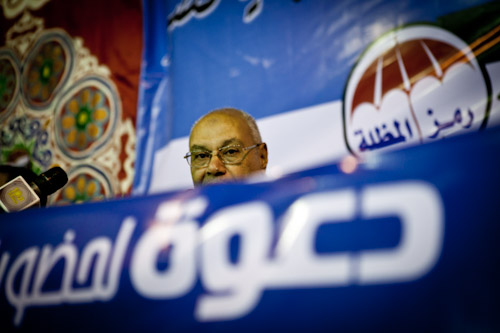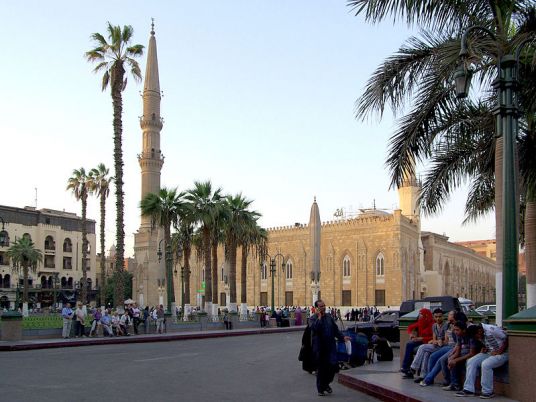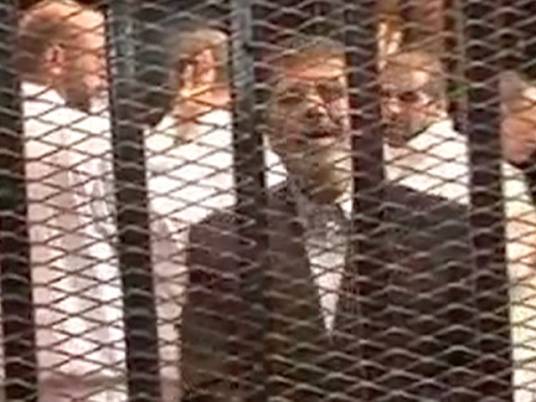
“It’s 10 pm,” one of three galabeya-wearing men huffs as they make their way towards the exit. “I’m not spending my night out here.” Mohamed Selim al-Awa is an hour and a half late to his last rally, and campaigners are lining at the gate, trying to persuade a steadily retreating audience to wait “just ten or 15 more minutes.” Of the 300 or so available seats at the opposite end of the space, only 24 are full, many with children. A larger number of them play a variation of Sumo wrestling on a thin strip of red carpet, their cheers providing the only soundtrack to an otherwise hushed setting. Neighborhood residents shuffle up to the entrance, ask a question or two, and move on. Overhead, a string of lights blinks silently. The guy responsible for setting up the lights, frowning, climbs a ladder and takes down the sign promoting his business.
While the presidential candidate will eagerly recount pre-revolutionary tales of his own battles against the forces of corruption, and his endless plight to secure the rights of all those debased by them, he’s reluctant when it comes to discussing less laudable endeavors. Awa is still struggling to shake off allegations he made against the nation’s Copts in 2010, and, despite his widely recognized standing as an eminent Islamic scholar, he’s also managed to anger stricter members of his own faith by suggesting that Shia Muslims be allowed to integrate into the community — comments which, in both cases, he maintains were taken out of context, but to no less damaging effect. Criticized for not taking a strong enough stance against the military ruling council, tossed out of Tahrir Square by protesters, and passed over for presidential endorsement by Wasat — a political party of which he was a founding member — Awa’s campaign trail is one that’s seen precious few peaks. And on his penultimate night of campaigning, it’s a movement that, for all intents and purposes, seemed to be out of steam. To top it all off, the candidate had the sniffles.
“You’ll have to excuse Dr. Awa, he has a bad cold and won’t be able to stay long,” a campaign official announces as the candidate takes his seat onstage.
Occupying a narrow alleyway off an Imbaba side street, Sunday night’s Awa rally started without a stir, or any sense of consequence. When he finally arrived, it was to equally little fanfare: despite the presence of both a large and empty bus bearing his image and a truck with LCD screens embedded in its sides clogging up the area’s main street, Awa stepped out of the passenger seat of a black sedan, exchanging handshakes and putting obvious effort into not looking depleted. Following a brief introduction, Awa spoke of the glory of the revolution and the sins of the former regime’s “kings” and “pharaohs,” but he only really connected with the crowd when he started talking about a prince — specifically “Al-Brins,” the iconic restaurant one block down from the rally.
“We need a president who will roam neighborhoods such as this, who will recognize when so-and-so has lost weight, or when someone else has broken an arm. A president who knows what the people eat, and eats that same food with them, maybe at Al-Brins, where I frequently enjoy a nice meal and pay for it myself.”
“We want a president,” he continued, “who knows the difference between breakfast and dinner.”
At this point, the audience had more than quadrupled — to approximately 150 people, children and reporters included. With the crowd cheering, and some even on their feet, Awa rode the wave straight into the scheduled Q&A session, doing his best to come across as a strong, but fair — sometimes even poetic — man. Asked about the judicial system, he compared it to the pyramids and the deterioration they’ve seen over the years. “You can’t even climb them anymore,” he said at the end of a lengthy tangent. “I took my son once, but it’s dangerous.”
When not met with stories and symbolic observations, several other questions were answered dismissively, with a, “Well, I’m not president yet, and that’s why (blank) is in such a miserable state,” — in most cases, “blank” being the economy. Failing that, Awa’s strategy consisted of the everyman routine, or advising audience members to follow their hearts. When one young woman addressed fears of “Parliament and their version of Sharia,” the candidate replied, “When Parliament is wrong, it’s wrong, and should be told so,” but also added, “Follow your heart, my daughter.” Some questions did receive detailed responses, such as one audience member’s concerns over Awa’s willingness to deal with the “Shia movement in Iran.”
“The Egyptians are not fools, and we will never allow the Shia to infiltrate us,” Awa replied, explaining that, “Egypt has long had economic relations with China, Japan, and even Israel. Yet we haven’t allowed those cultures and ideologies to change anything about us and with Iran it will be no different.”
Looking to another foreign country, Awa repeatedly reminded the audience “In 1984, Turkey was floating in its own sewage.” Listing the nation’s recent achievements and much improved global standing, Awa declared, “We are no less efficient or intelligent than Turkey, or Iran for that matter.”
“We have fallen behind,” he said. “And it’s up to you to decide if you want to keep falling, or move forward.”
He answered the next two questions by stating, “At the moment, the president does not have the power to dissolve Parliament,” and that certain issues, like restoring the population's sense of security, “will take years to improve. These are not problems you can solve with the push of a button.”
The candidate later announced that, as president, he would have “special files” made up for minorities, such as Copts and Nubians, to better focus on their issues. Discussing the Sinai Peninsula, Awa stated his intention to enforce actual visa requirements on Israelis, and to tear down [Moshe] Dayan’s Rock — an “offensive monument…on which is inscribed, in Hebrew, ‘We shall return,’” — a statement frequently attributed to the Palestinian cause.
“As for the gas, they’ve stopped paying so now we have an excuse to kill the deal altogether,” Awa said, beyond which he avoided discussing Israel, focusing instead on the audience’s “questions.”
Awa asserted that, under his presidency, rights would be regained all across the national spectrum. The independence of women would be recognized, a sense of national dignity would be restored, and the poor and marginalized will be sheltered and properly fed. “Nobody will have to live off of chicken foot soup,” he said, again, to generous cheering.
“This is all good talk, everything he’s saying,” an audience member later observed. “But the problem is will it be enough?” Claiming to have “over a million friends” on his Facebook page, the youth expressed his intention to spread Awa’s message online. When asked if he believes that will make a difference, he replies, “God willing, but you do what you can to help.”
The night ended an hour after it had started, with Awa “ready to collapse,” but accepting more questions as he made his way to the exit. At one point, an audience member called out to the candidate, asking how he felt that his former party had chosen to endorse one of his rivals, and if Awa was not affiliated with any other party.
“I am affiliated only with you,” the candidate smiled. “And I couldn’t be prouder of my former party members. They displayed exactly what I taught them: they considered their options, exercised their right to form an opinion, and followed their hearts.”



